 The following statement was initiated by Palestinian activists in North America. Samidoun is one of the initiating signatories:
The following statement was initiated by Palestinian activists in North America. Samidoun is one of the initiating signatories:
SIGN ON: Email NoToNegotiations@gmail.com or use the form: http://bit.ly/NoToNegotiations
We, the undersigned Palestinians and Palestinian organizations in shatat and exile, write today to express our firm opposition to the resumption of bilateral Israeli/Palestinian negotiations under U.S. auspices in Washington DC, today, July 29.
For twenty years, the negotiations have not served Palestinian interests. Through countless sessions of futile negotiations, Israeli settlement construction has escalated, thousands of Palestinian political prisoners are held behind bars and Palestinian rights – including Palestinian refugees’ right to return – are no closer to implementation. While the Netanyahu government is planning the massive dispossession of Palestinians in the Naqab via the Prawer Plan, the negotiations serve only to provide a thin veneer of legitimacy to the aggressive policies of Israeli occupation and apartheid.
Our rights – the rights of the Palestinian people – and our land – the entire land of Palestine – are not for sale or bartering at the negotiations table. That this process is presided over by the United States government, which provides $3 billion annually in military aid to Israel, and specifically by Martin Indyk, former research director at infamous Israel lobby organization the America Israel Public Affairs Committee, only adds insult to injury and makes clear that these negotiations will bring nothing of value or benefit to the Palestinian people.
Today, we say: PA President Mahmoud Abbas does not represent us! Our rights cannot and will not be bargained away at a negotiating table in Washington, DC.
Instead, we affirm that the Palestinian people are one people and our cause is one cause. Our people have struggled for 65 years in order to achieve the liberation of the land and people of Palestine and the implementation of the right of Palestinian refugees to return their homes.
As Palestinians in shatat/diaspora, we are not being represented here, and we demand to reclaim our voice and role. We do not accept these negotiations, and our rights, our people and our land are not for sale!
SIGN ON: Email NoToNegotiations@gmail.com or use the form: http://bit.ly/NoToNegotiations
Signatories
Signatories
Al-Awda NY – Palestine Right to Return Coalition
Al-Awda FL – Palestine Right to Return Coalition
Al-Jisser Group
Al-Nakba Awareness Project
Austin Coalition for Palestine
Boycott Israeli Apartheid Campaign – Vancouver
Bristol Palestine Solidarity Campaign
Canadian Students’ Coalition for Palestine
Canaan Association from Venezuela: Palestinian Diaspora
Divestment Resource Center
Labor for Palestine
Merton Palestine Solidarity Campaign
Palestine Aid Society of America
Palestine Solidarity Group – Chicago
The Palestine Telegraph
Palestinian American Society – Rancho Cucamonga, CA
Samidoun Palestinian Prisoner Solidarity Network
Solidarity for Palestinian Human Rights at McMaster University
Solidarity for Palestinian Human Rights at University of Calgary
Students for Justice in Palestine at Florida Atlantic University
Students for Justice in Palestine at Brooklyn College
Students for Justice in Palestine at Hunter College
Students for Justice in Palestine at College of Staten Island
Students for Justice in Palestine at John Jay College
Students for Justice in Palestine – University of Nebraska at Omaha
Students for Justice in Palestine – Ryerson University
Students for Justice in Palestine – Rutgers, New Brunswick
Students for Justice in Palestine – Rutgers – Newark
Toronto Students for Justice in Palestine
US Palestinian Community Network
Voice of Palestine
Women for Palestine
1948 Lest We Forget
Abdullah Khalifeh, Vancouver, BC, Canada
Abe Deeb, Dublin, Ireland
Abeer Fadda, Heidelberg, Germany
Ahmad Ali Bawab, Amman, Jordan
Ahmad Kawash
Akram Shaban, Vancouver
Ala Ramahi, Bloomington, IL
Alaa Milbes, Los Angeles, CA
Alladin Albawab, Jordan
Ali Salama, London
Ali Yassir, Montreal
Amani Barakat, Moorpark, California
Amar Husain, USA
Amer Shurrab, Monterey, CA
Amer Taha, Houston, Texas
Amin Arar, Amman
Amin Husain, New York City
Anas Amireh, Coral Springs, FL
Aya Dama, London
Ayham Salameh, Windsor, ON, Canada
Ayman Al-Atwani, Toronto, Canada
Bader Takriti, Montreal, QC
Bargas Hatem
Bashar Lubbad, Malmo, Sweden
Bianca Shana’a, Paris
Burhan Ghanayem, Bahama, NC
Cynthia George Taha, Bellingham
Daleen Elshaer, Washington, DC
Dana Olwan, Syracuse, NY
Deena Duwaik, Aurora, CO
Diana A Shuman, Chicago, IL
Dina Elmuti
Dina Omar, New Haven, CT
Dina Shana’a, Washington, DC
Dr. Anita Shanley, Edinburgh
Dr. C. Nureddin Awad, Cuba
Dr. Ismail Zayid, Halifax, Nova Scotia, Canada
Dr. Jamal Abu-Attiyeh, Oxford, Ohio
Dr. Samir Abed-Rabbo, Texas
Edgar Tawfiq Zarifeh, Toronto
Ehab A. Alrmoony, Amman, Jordan
Ehab Shqair, Pacifica, CA
Eid Masri, Alta Loma, CA
Elias Harb, editor, intifada-palestine.com
Eyas Alhomouz, Denver, CO
Ezdihar Shalabi, Oak Forest
Fadi Saba, San Jose, USA
Fadi Shbita, Montreal, Canada
Falastine As-Saleh, Palestine
Farah S., Canada
Farid Bitar, New Jersey
Farouq Shafie, Ann Arbor, Michigan
Faten Dabis, Chicago, IL
Faten Toubasi, Toronto, Canada
Fayez Abdel-Fattah, Poland
Feras Al-Hefnawi, USA
Fuad Abboud, Calgary, Canada
G. Nijim, Indiana, USA
Gale Khoury, Connecticut
Ghada Talhami, Evanston, Illinois, US
Ghasan Taha, Bellingham
Ghassan Alami, VA
Ghassan Al-Sahli
Gihad Ali, Chicago, IL
Haitham Salawdeh, Wauwatisa, WI
Haithem El-Zabri, Austin, TX
Hala George, Scotland
Hamed Khalil Awad Ahmad, Amman, Jordan
Hanaa Yosef, Lebanon
Hani Al-Qasem, UK
Hanna Gamal Eldin, Philadelphia, PA
Hanna Kawas, chairperson, Canada Palestine Association and co-host, Voice of Palestine
Hatem Abudayyeh, Chicago, IL
Hazem Ghanam, Coquitlam, BC, Canada
Helmy Mostafa, Jackson, PA
Hicham Harati
Ibrahim Quadan, Australia
Ida Audeh, Colorado
Imad Hatu, Chicago
Imad Shalbak, Bayshore, NY, USA
Inas Abbas, Berlin, Germany
Isam Nubani, Canada
Issam Al-Yamani, Toronto, Canada
Iyad Arar, Edmonton, Canada
Iyas AlQasem, London, UK
Jadallah Safa, Brazil
Jafar Ramini, London
James Abourezk, South Dakota
Prof. Jamil Fayez, MD, Vienna, VA
Jawad Jaser Abukhalaf, NJ, US
Jilnar Ramahi, Amman
Joseph Bedri, El Dorado Hills
Kamal Boullata, France
Kamal Hassan, Grants Pass, Oregon, USA
Karmel al-Ramahi, Jordan
Khaled Abulaban, Fairfax, VA
Khaled Barakat, Vancouver, Canada
Khaled Mouammar, Richmond Hill, Ontario, Canada
Laith Marouf, Montreal, Canada
Lamis J. Deek, J.D., NY/ Huwarra Nablus Palestine
Lamis Kayali-Sakr, Rockville, Maryland
Loai Najjar, San Jose, CA
Lutuf Ghantous, Wilmette, IL
Maher Alrai, Minnesota
Mahmoud Abdulal, Sweden
Majdi Rabah, Bahrain
Mariam Abu Thallam, Amman
Marsilio Salem
Mary Abukhudeir, Chicago, IL
May Abboud, Bethesda, MD, USA
Mazin Al Nahawi
Mohamed Salah El Ramahi, Algiers
Mohammad Abd-Elsalam
Mohammad Awadallah, North Bergen, NJ
Mohammad Dalbah, Journalist
Mohammad Ghbari, Jordan
Mohammad Horreya, Toronto
Mohammad S. Al-Hreebat
Monadel Herzallah, California
Monira Kitmitto, Toronto, Canada
Moussa H Kassis, Girard, Ohio
Muaffaq Askar, New York
Muath Abualqumssan, Yellowknife, NT, Canada
Muayad Qasem, NYC
Munir Atall, Boston, MA
Murad Din, Vancouver, Canada
Nabil Ayad, California
Nabil Keilani, San Diego, CA, USA
Nabila Mango, San Mateo, California
Nadia Arouri, Austria
Nadia Shoufani, Toronto, Canada
Nadine Kallas, Vancouver, Canada
Nahla Abdo, Canada
Nasser Mashni, Australia
Nicola Abu-Khalil, Germany
Nicolas A. Sayegh, Laval, Quebec, Canada
Nidal A. Barakat, Los Angeles, California
Nidal Elkhairy, Amman, Jordan
Noor Fawzy, Coral Springs, FL
Nour Abed, Detroit, Michigan
Noura Khouri, Oakland
Rabab Abdulhadi, California
Rabia Shafie, Ann Arbor, MI
Rabiah Nezar, Lansing
Rafe Abdulla, Winnipeg, Manitoba, Canada
Rafik Neme, Colombia
Rajai Ghattas, Vernon, BC, Canada
Raji Abuzalaf, Hawaii
Rami Alsaqqa, Vancouver, Canada
Rami Bisher, Amman, Jordan
Rami Mohammed, Cliffside Park, NJ
Ramy Abdeljabbar, Paterson, NJ
Ramzi Issa, North Bergen, NJ
Ramzy Baroud, author and journalist
Rana Hamadeh, Ottawa, ON, Canada
Randa Jazairi, Conway, NH
Randa Kamal, San Francisco, California
Rania Lafi, Amman, Jordan
Rania Laswi, Amman, Jordan
Rania Madi, Geneva, Switzerland
Remi Kanazi, New York, NY
Rena Zuabi, Palestine
Rima Hijazi, Vancouver
Rima Najjar, Bloomington, IN
Rob Moubarak, Ontario, Canada
Sabha Salman, Jerusalem
Sabrina Azraq, Toronto, Canada
Said Belabed, Jackson Heights, NY
Said Shehadeh, California
Salah Al-Aswad, Hamburg, Germany
Salah Fakhri Khalaf, Hamilton, ON
Salah Hamouri
Salim A.S. Al-Nabahin
Salma Abu Ayyash, Cambridge, MA
Samah Sabawi, Melbourne, Australia
Samar Yunis, Kuwait
Sameh Hammouri, Amman, Jordan
Sameria Ramadan, Oak Lawn, IL
Sami Joseph, Bucks, UK
Sami Musleh, Burnaby, BC, Canada
Sami Zubi, Canada
Samia A. Halaby
Samia Shannan, Jerusalem, Palestine
Samir Khadra, IN, USA
Samir Mohammad
Samira Ahmad, Illinois, US
Sammy Alqasem, Baltimore, MD, USA
Sana Ibrahim, USA
Sana Kassem, Athens, Greece
Sanah Yassin, Chicago, IL
Sarona Abuaker Bedwan, Charlotte, NC
Shahin Shabanian, Williamsport, PA, US
Suhail Shafi, Ozark
Suleiman Hodali, Los Angeles, CA
Sumbal Naz
Susana Khalil, Venezuela
Taher Naser, Oman
Talal A. Kanaan
Tarek Abu-Jbarah, Boston, MA
Tarek Zaher, Terre Haute, IN
Tareq Salameh, Alexandria, USA
Tariq Abuhamdia
Tariq Alardah, Dubai, UAE
Tawfiq Mousa, California
Wafaa Adwan, Palestine
Waqar Mohsin, Manchester
Wesam al-Khatib, Jordan
Wesam Cooley, Calgary, Alberta
Yahya Ghunaim, Los Angeles, CA
Yara Erian, London, Ontario
Yasmeen Daher, Montreal, Canada
Yasmine Atari, Waterloo, Canada
Yasmine Wasfi, Doylestown, PA
Yousef Abudayyeh, San Diego, CA
Ziyad Zaitoun, Seattle
 NEGOTIATIONS IN PALESTINE: What do they mean? Why are they happening?
NEGOTIATIONS IN PALESTINE: What do they mean? Why are they happening?
 The following statement was initiated by Palestinian activists in North America. Samidoun is one of the initiating signatories:
The following statement was initiated by Palestinian activists in North America. Samidoun is one of the initiating signatories: Palestinian prisoners affiliated with the Popular Front for the Liberation of Palestine in the southern prisons – Eshel, Nafha, Ramon and Negev – held a partial hunger strike on Friday and Saturday, August 2 and 3, in solidarity with the imprisoned PFLP leader, Mohammad Rimawi, who is one of five Palestinian prisoners holding Jordanian citizenship who has been on hunger strike for 91 days.
Palestinian prisoners affiliated with the Popular Front for the Liberation of Palestine in the southern prisons – Eshel, Nafha, Ramon and Negev – held a partial hunger strike on Friday and Saturday, August 2 and 3, in solidarity with the imprisoned PFLP leader, Mohammad Rimawi, who is one of five Palestinian prisoners holding Jordanian citizenship who has been on hunger strike for 91 days. Palestinian prisoner Ahmed Ismail Uwaini was released on August 1 after 11 years in Israeli prisons. Uwaini, who was born in the Bureij refugee camp in central Gaza, is affiliated with the Popular Front for the Liberation of Palestine, whose members and friends welcomed Uwaini at the Beit Hanoun crossing.
Palestinian prisoner Ahmed Ismail Uwaini was released on August 1 after 11 years in Israeli prisons. Uwaini, who was born in the Bureij refugee camp in central Gaza, is affiliated with the Popular Front for the Liberation of Palestine, whose members and friends welcomed Uwaini at the Beit Hanoun crossing.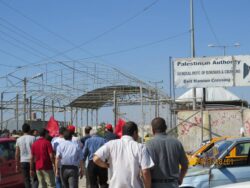
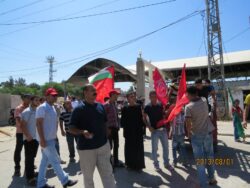
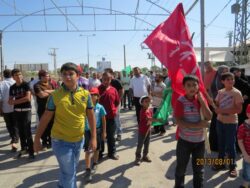
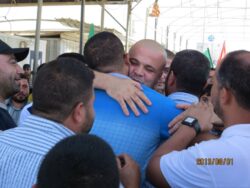
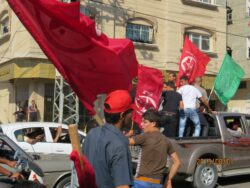
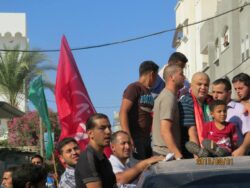
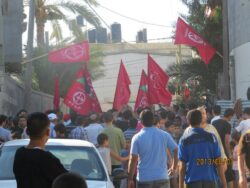
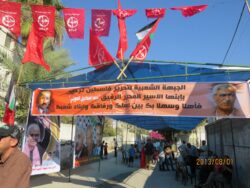
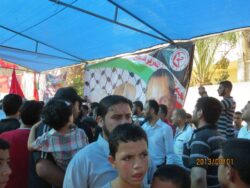
 The appeal of Palestinian academic and administrative detainee
The appeal of Palestinian academic and administrative detainee  The Israeli Supreme Court rejected the petition on behalf of Palestinian administrative detainees Adel Hareebat and Ayman Al-Tabeesh, who have been on hunger strike since May 23.
The Israeli Supreme Court rejected the petition on behalf of Palestinian administrative detainees Adel Hareebat and Ayman Al-Tabeesh, who have been on hunger strike since May 23. Rafah municipality held a day of solidarity with hunger striking prisoner Abdullah Barghouthi, who has been engaged in a hunger strike for 91 days. Barghouthi is currently held in Afula hospital, shackled to his bed. Osama Abu Zayd of Rafah municipality said that it is a national duty to support all political prisoners and prisoners of war.
Rafah municipality held a day of solidarity with hunger striking prisoner Abdullah Barghouthi, who has been engaged in a hunger strike for 91 days. Barghouthi is currently held in Afula hospital, shackled to his bed. Osama Abu Zayd of Rafah municipality said that it is a national duty to support all political prisoners and prisoners of war.
 Palestinian prisoner Bassam Obeid, of Arraba village outside Jenin, has been held in isolation in Ramon prison for 39 days, as part of the policy of arbitrary transfers exercised against him and his fellow prisoners by the Israeli Prison Service.
Palestinian prisoner Bassam Obeid, of Arraba village outside Jenin, has been held in isolation in Ramon prison for 39 days, as part of the policy of arbitrary transfers exercised against him and his fellow prisoners by the Israeli Prison Service. Israeli investigators detained a Palestinian Ph.D. student for affiliation to Islamic Movement Hamas, based on comments and ‘likes’ on Facebook, the
Israeli investigators detained a Palestinian Ph.D. student for affiliation to Islamic Movement Hamas, based on comments and ‘likes’ on Facebook, the 